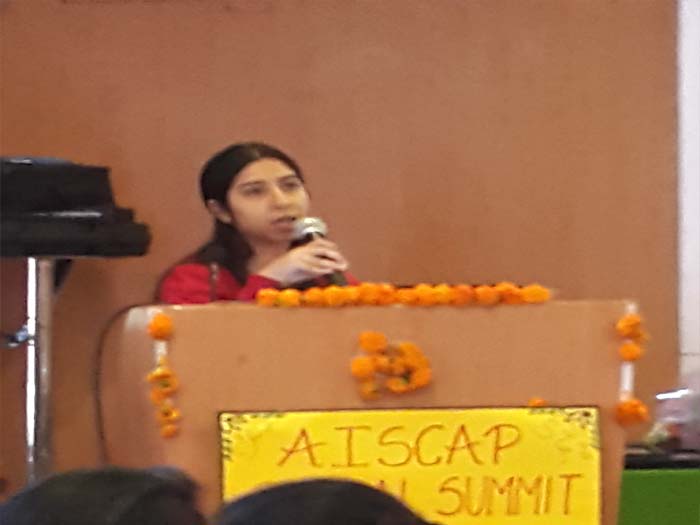Global Summit 2016
Enriching Skills for Health, Behaviour and Well-being in Schools- workshop.
The Association of Indian School Counsellors and Allied Professionals (AISCAP) organised a Global Summit on the theme, Enriching Skills for Health, Behaviour and Well-being in Schools at Moolchand Medicity. The summit, a two-day event, held on the 24th& 25th of February, 2016 was attended by our school counsellor, Ms. Enakshi Rai.
[gallery link="file"]
Education has a great psycho-social importance in the modern and complex society that we live in today. Over the years, the role of education has undergone transformation in order to holistically address the growing demands of our civilisation. The summit aimed to explore these changing needs, challenges, roles and the purpose of education today.
There is a need to review the traditional approach to education and to innovate in a sustainable manner to make it more inclusive. People living in the digital world no longer exist within the confines of their little communities. The purpose of attending this workshop was to understand and address the implications of this on global culture, health, mental and social wellbeing.
The event started with the registration process. Several video clips on youth, bullying-free schools, the preservation of nature and global warming were being played in the background. It was followed by the lighting of the lamp and the release of the souvenir of the conference by the dignitaries. The dignitaries of the event were Professor Kavita Sharma, Professor Namita Ranganathan, Professor J.L. Pandey, Ms. Ameeta Mulla Wattal and Mr. George Ibrahim.
The first session of the Global Summit on the topic, Skills Enrichment for Well Being Educators at School was initiated by Professor Kavita Sharma. She spoke about the blurring of lines between judicial authorities and political beings and how the Guru Shishya Parampara has changed over the years. She also discussed areas where one should restrict the freedom of speech and the problems associated with drugs, alcohol and smoking. She suggested that counselling should not be offered only to students but to both teachers and the parents.
Her other recommendations were having education programmes which cater to the local needs of the community, having a good physical environment at School which should include good ventilation, well-lit rooms, clean washrooms, safe drinking water and adequate space for children to play. She also gave a model of the psycho-social environment which should be just, fair and happy, and one which seeks to discourage physical and other violence, has a support mechanism for children with learning disabilities and enhances the skills of teachers and parents.
The next speaker for the day was Ms. Ameeta Wattal, Principal of Sprindales School. She discussed the importance of connecting with children at the school level so that they become thinking activists. We should engage the students in activities which enhance their creativity.This could be challenging for the teacher as the classroom comprises of students from diverse backgrounds. As per the figures given by her, an Indian classroom has 20% students who are overweight, 10-15% with behavioural issues, 5% have one or the other medical condition, 5% have learning disabilities, 10-15% have nutritional deficiencies, 2% are from single parent families and 25% of them belong to the economically weaker section. According to her, the problem lies in how to engage such a classroom.
She also voiced that the school is a mirror of the society we live in, hence, School should be, A school with a heart. or a counselling school where every teacher is a counsellor.
On the other hand, Professor Namita Ranganathan used cricket and Hindi films as two unifiers. She presented a video clip of several movies such as Lunchbox, Chillar party, Slumdog millionaire, etc. to highlight the multiple contours of childhood in India.
The subsequent day was followed by paper presentations. I presented a paper on the topic, Emotional and Social Adjustments among Adolescent Students. The next session was on operationalising the POCSO Act 2012 in schools. The nitty-gritties of this act were talked about at great length.
The day came to a close with an interactive session on experiencing mindfulness in education. It was conducted by Dr. Soorya Kaur and Ms. Mehak Walia. It was a hands'-on session that showed us how to use various techniques like meditation, breathing exercises and postures as the means to promote well-being in schools.
Ms. Enakshi Rai.













